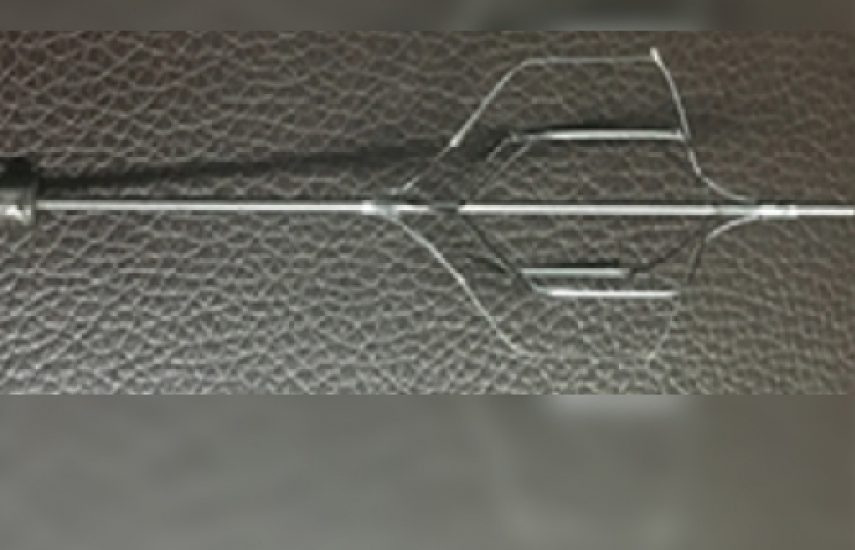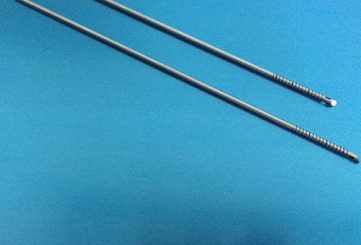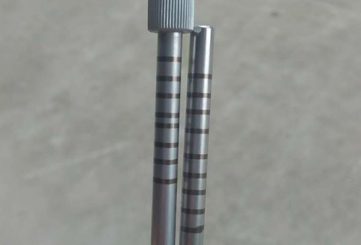Ni-Ti Venous Filter Shape Welding
Ni-Ti Venous Filter Shape Welding — a high-precision welding solution for medical filter manufacture
The Ni-Ti Venous Filter Shape Welding is a laser-welding process tailored for nickel-titanium venous filters and similar medical implant components. It delivers strong, seamless joints with extremely fine weld spots, minimal thermal distortion, excellent surface quality, and reproducible precision. Designed for applications where strength, biocompatibility, and micro-scale accuracy are critical.
Key Features:
- High Precision: welding spot size below Ø 200 µm ensures ultra-fine joins and minimal bulk.
- Smooth Finish: welds show no deformation, bumps or discoloration, preserving the integrity and appearance of the component.
- Efficient Processing: pneumatic automatic control for precise clamping to secure workpieces during welding.
- Material Versatility: compatible with nickel-titanium (Ni-Ti) and also works with alloys such as stainless steel, platinum-iridium, tantalum, cobalt-base materials, aluminium, and copper.
- Advanced Technology: uses 2D and 2.5D CAM software to program weld paths and to maintain repeatability.
Certification and Standards:
Manufactured in strict compliance with international medical device regulations; processes meet high precision standards for biocompatible materials, traceability, and laser safety relevant to medical implants.
Stainless Steel SUS304:
Medical-grade SUS304 stainless steel (austenitic chromium-nickel alloy), offering excellent corrosion resistance and mechanical properties.
- Biocompatibility: Low risk of allergic reactions or toxicity, ideal for direct tissue contact in medical procedures.
- Mechanical Properties: High tensile strength (approximately 505 MPa) and elongation (up to 40%), providing flexibility without brittleness.
- Surface Finish: Laser-machined for smooth, burr-free edges, reducing the potential for tissue trauma or contamination.
- Thermal Stability: Maintains integrity across a wide temperature range, suitable for sterilization processes like autoclaving.
Platinum-Iridium:
Platinum-Iridium is a biocompatible, corrosion-resistant alloy with exceptional durability and conductivity. Ideal for precision laser welding, it ensures strong, smooth joints for critical medical components like stone basket heads.
Cobalt Base:
Cobalt Base alloys are highly durable, corrosion-resistant materials with excellent strength and biocompatibility. Perfect for precision laser welding, they provide robust, smooth welds for medical components like stone retrieval baskets.
Nickel-Titanium alloy:
Nitinol (NiTi), a nickel-titanium alloy, is renowned for its superelasticity and shape memory, making it a game-changer in medical applications. With a tensile strength of up to 1200 MPa and elastic modulus of 40–75 GPa, nitinol excels in demanding environments.
Aluminum alloy:
Aluminum Alloys are lightweight, medical-grade materials valued for their excellent corrosion resistance and high strength-to-weight ratio. With tensile strength typically ranging from 200–600 MPa and good ductility, they offer durability for medical and industrial applications. Their biocompatibility supports use in non-implantable devices and components. Laser-machined for smooth, burr-free surfaces, they minimize contamination risks and ensure compatibility with sterilization processes.
Copper (Cu):
A conductive, antimicrobial metal used in medical equipment and coatings. Its excellent electrical conductivity and natural resistance to bacteria enhance device functionality and hygiene.
Tantalum:
Tantalum is a highly corrosion-resistant, biocompatible metal with excellent strength and ductility. Ideal for precision laser welding, it ensures robust, smooth joints for critical medical components like implants and surgical instruments, offering superior radiopacity and durability.
- Manufacturing of venous filters, including Ni-Ti filter frames and shapes.
- Precision welding in surgical instruments and other medical equipment components.
- Any application demanding very small weld spots, minimal heat-affected zones, and biocompatible metal joins.
- Weld spot diameter: < 200 µm
- Finish: no deformation, no bumps, no discoloration
- Clamping: pneumatic automatic control
- Software: 2D and 2.5D CAM systems
- Compatible materials: Ni-Ti, stainless steel, platinum-iridium, tantalum, cobalt-base, aluminum, copper





